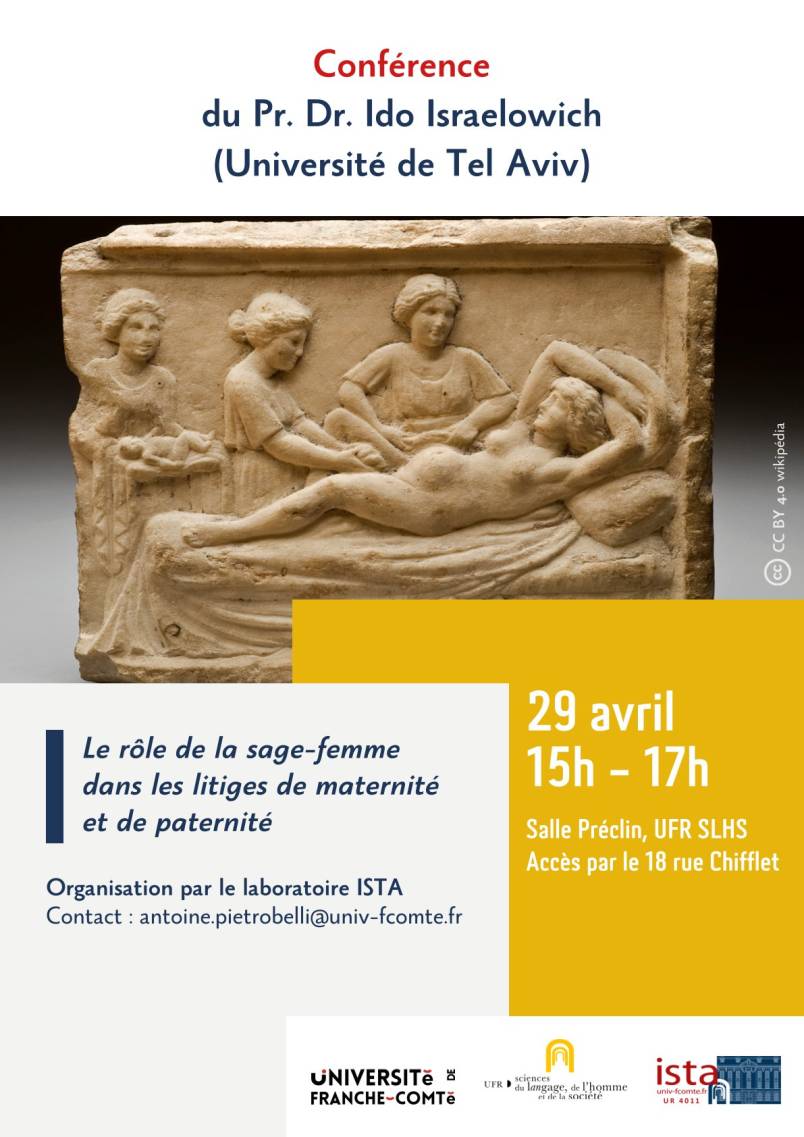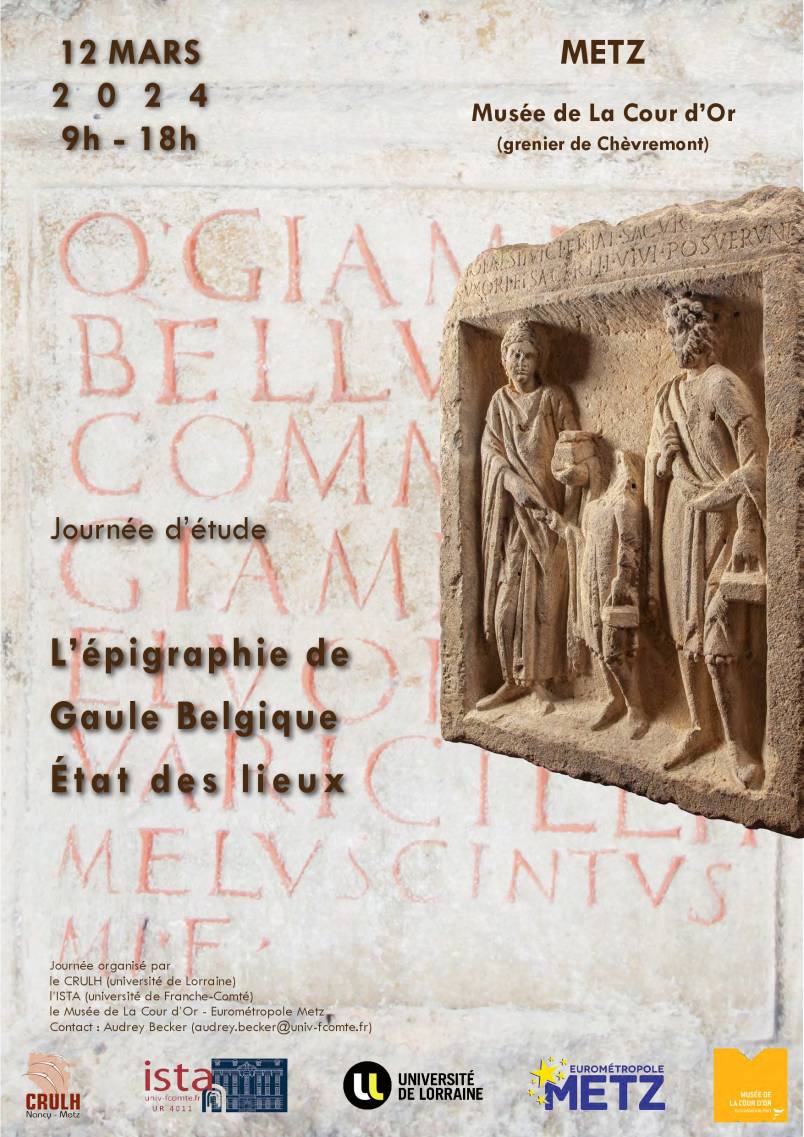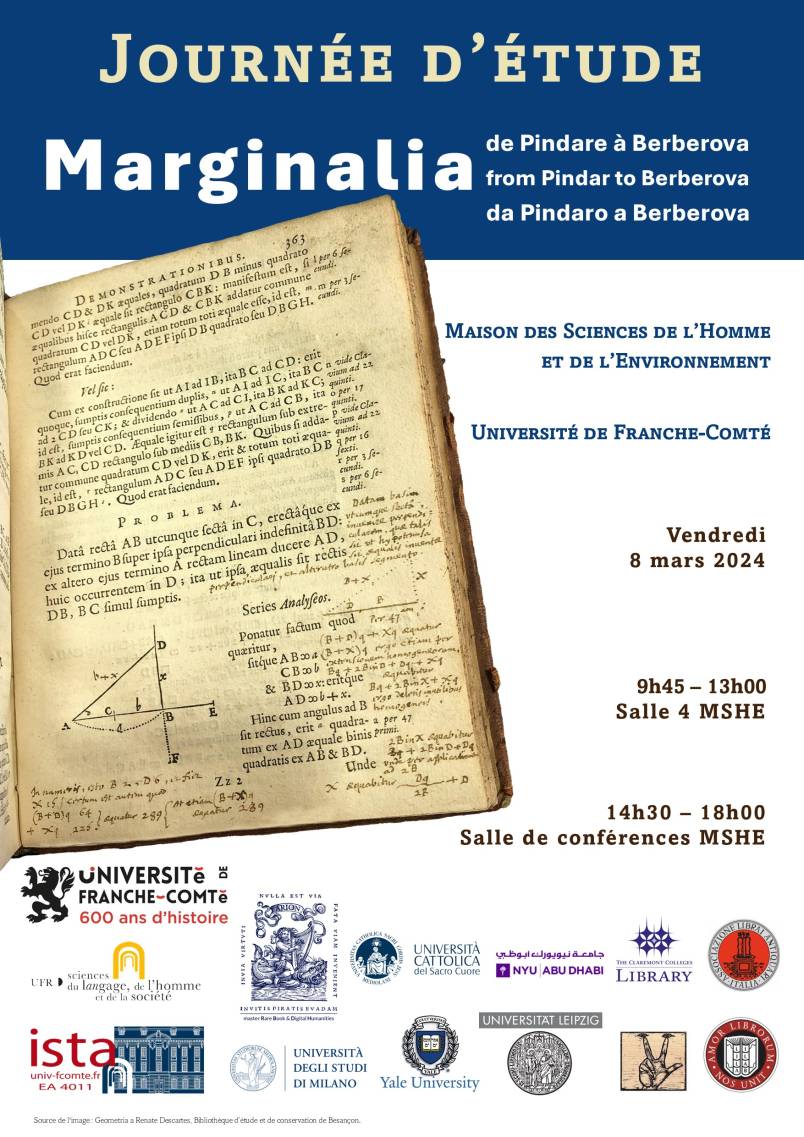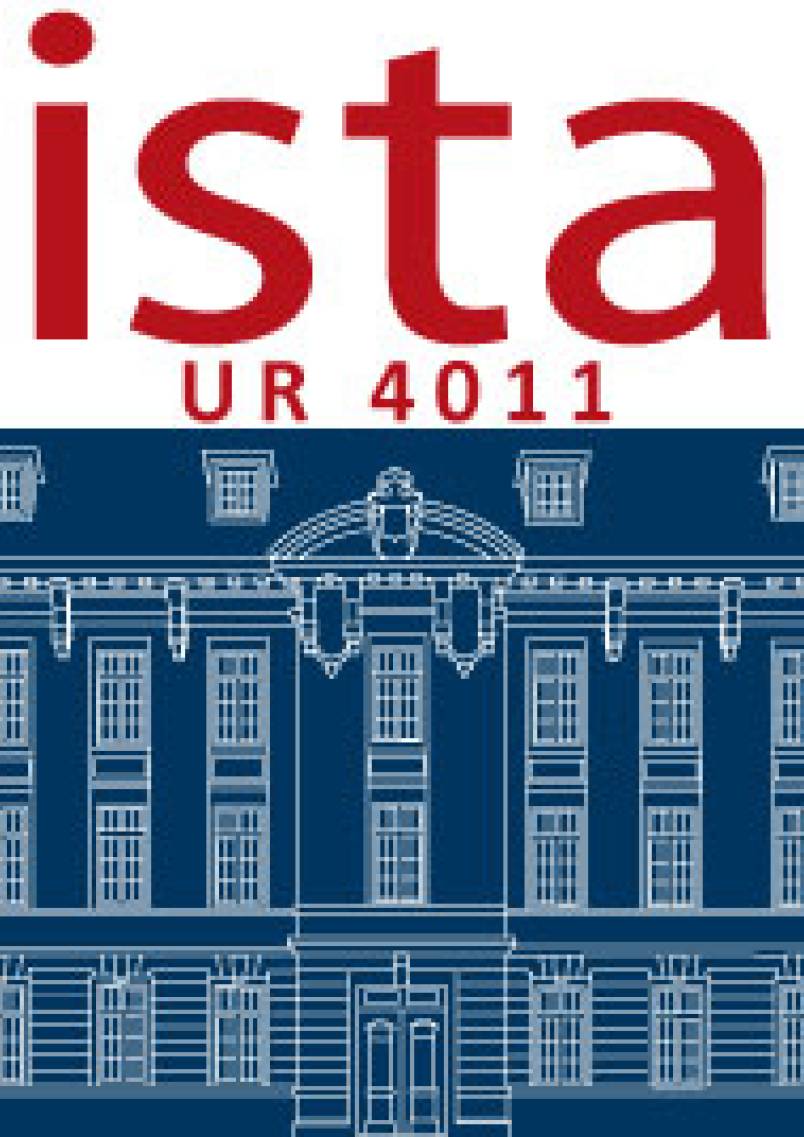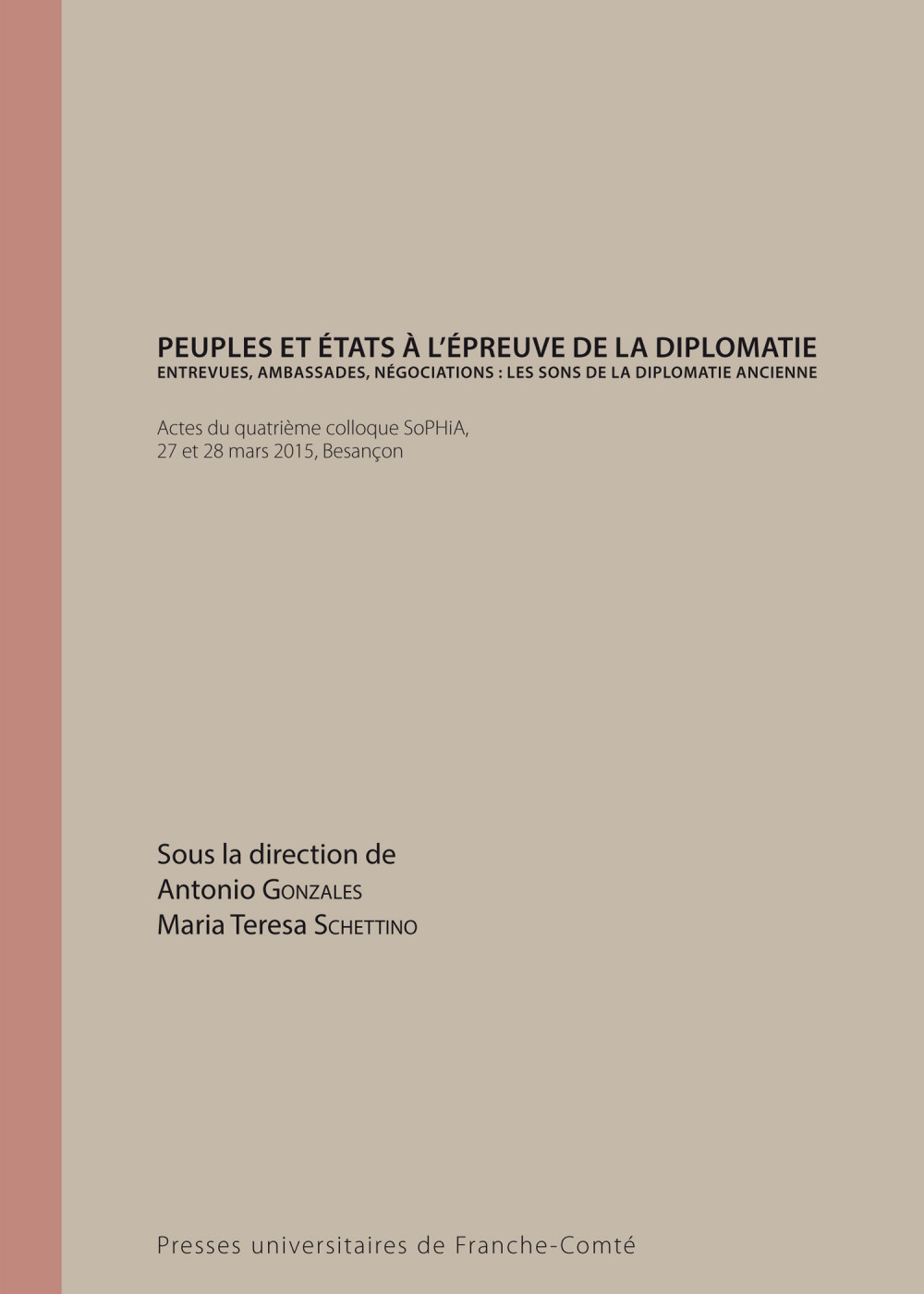PUFC
Les antinomies sonores dans les pratiques diplomatiques antiques
Antonio GONZALES, Maria Teresa SCHETTINO
L’art de la diplomatie dans le Proche Orient
Experts de la parole au Proche Orient ancien : diplomates, messagers, interprètes
Clelia MORA
Parler avec le Grand Roi Perse : ambassades, lamentations
Ennio BIONDI
Les sons de la négociation avec le pouvoir politique
I retroscena di un’ambasceria: il caso della Legatio di Filone Alessandrino
Lucio TROIANI
Ambasciatori interpreti e repertori non condivisi: la comunicazione diplomatica fra culture diverse in Erodoto e le sue implicazioni sonore
Nella SUDANO
Le bruit et le silence comme reflet de la hiérarchie politique
Trajan et Parthamasiris à Élégeia
Giusto TRAINA, Anahide KEFELIAN
Les Gréco-Romains face aux langues barbares à la fin de l’Empire : permanences et mutations d’une domination linguistique pluriséculaire (réflexions autour de Histoire Auguste, Aurélien, 27, 6)
Agnès ARBO
Etnografia tardoantica e prassi diplomatica: considerazioni sulla dimensione sonora dei rapporti tra Romani e “barbari” di area renano-danubiana
Umberto ROBERTO
Apprendre la force des mots par les savoirs philosophiques et religieux
Ἐγὼ διηγεῦμαι. Le son de la loi entre oralité et écriture chez Héraclite, « exégète » et « diplomate »
Fabio STELLA
Muta Tacita, déesse du panthéon romain ?
Guillermo ALVAR NUÑO
Ce volume s’inscrit dans le cadre des nouvelles pistes méthodologiques sur l’étude de la diplomatie antique et se propose d’analyser les implications politiques et sociales des manifestations sonores dans les pratiques diplomatiques. L’approche sonore appliquée à l’étude de la diplomatie antique dépasse ici pour la première fois l’horizon gréco-romain pour s’ouvrir à d’autres civilisations de la Méditerranée antique. Cette perspective chronologique a permis non seulement de nuancer des idées reçues sur la place disproportionnée du bruit et du silence dans les civilisations de la Méditerranée mais aussi d’étudier le rapport problématique entre les manifestations sonores et la hiérarchie politique dans les contextes diplomatiques.
This volume is part of the new methodological approaches to the study of ancient diplomacy and aims to analyze the political and social implications of sound manifestations in diplomatic practices. The sound approach applied to the study of ancient diplomacy for the first time goes beyond the Greco-Roman horizon to open up to other civilizations of the ancient Mediterranean. This chronological perspective made it possible not only to qualify conventional wisdom about the disproportionate place of noise and silence in the civilizations of the Mediterranean, but also to study the problematic relationship between sound manifestations and political hierarchy in diplomatic contexts.
Este volumen es parte de los nuevos enfoques metodológicos para el estudio de la diplomacia antigua y tiene como objetivo analizar las implicaciones políticas y sociales de los eventos de ruido en las prácticas diplomáticas. El enfoque de sonido aplicado al estudio de la diplomacia antigua por primera vez va más allá del horizonte greco-romano para abrirse a otras civilizaciones del Mediterráneo antiguo. Esta perspectiva cronológica hizo posible no solo calificar las ideas convencionales sobre el lugar desproporcionado del ruido y el silencio en las civilizaciones del Mediterráneo, sino también estudiar la relación problemática entre las manifestaciones sonoras y la jerarquía política en contextos diplomáticos.
Warning: Creating default object from empty value in /var/www/ista/html/publista/Commun/dbHelper.php on line 293
Warning: Creating default object from empty value in /var/www/ista/html/publista/Commun/dbHelper.php on line 293
Warning: Creating default object from empty value in /var/www/ista/html/publista/Commun/dbHelper.php on line 293
Warning: Creating default object from empty value in /var/www/ista/html/publista/Commun/dbHelper.php on line 293
Warning: Creating default object from empty value in /var/www/ista/html/publista/Commun/dbHelper.php on line 293
Warning: Creating default object from empty value in /var/www/ista/html/publista/Commun/dbHelper.php on line 293
Warning: Creating default object from empty value in /var/www/ista/html/publista/Commun/dbHelper.php on line 293
Warning: Creating default object from empty value in /var/www/ista/html/publista/Commun/dbHelper.php on line 293
Warning: Creating default object from empty value in /var/www/ista/html/publista/Commun/dbHelper.php on line 293
Warning: Creating default object from empty value in /var/www/ista/html/publista/Commun/dbHelper.php on line 322
Auteur : Clelia MORAExperts de la parole au Proche Orient ancien : diplomates, messagers, interprètes[Résumé]La diplomatie et les échanges entre les États avaient une longue tradition au Proche-Orient et en Égypte anciens, mais c’est surtout au IIe millénaire avant J.-C. qu’un complexe système de relations internationales se développe dans la région. Après une introduction qui examine le concept de « langue étrangère » et souligne les difficultés inhérentes le rôle des interprètes et des messagers, la contribution se concentre sur la documentation du Bronze Récent et notamment sur certains aspects du dossier mittanien d’El-Amarna. La dernière section examine le thème de la communication dans les inscriptions royales assyriennes du Ier millénaire avant J.-C. Mots-clés : Proche Orient ancien, Interprètes, Messagers, Diplomates, Communication. Abstract: Diplomacy and exchanges between states had a long tradition in the ancient Near East and Egypt, but a more complex system of international relations developed especially in the 2nd millennium BC. After an introduction, which examines the concept of “foreign language” and points out the difficulties that interpreters and messengers had, this paper focuses on the documentation from the LBA, particularly highlighting some aspects of the Mittanian dossier of the El-Amarna archives. The last section considers the theme of communication in the Assyrian royal inscriptions of the 1st millennium BC. Keywords: Ancient Near East, Interpreters, Messengers, Diplomats, Communication.
Warning: Creating default object from empty value in /var/www/ista/html/publista/Commun/dbHelper.php on line 322
Auteur : Ennio BIONDIParler avec le Grand Roi Perse : ambassades, lamentations[Résumé]L’article analyse la sonorité de la communication officielle et non officielle dans la cour perse telle qu’elle est présentée par les sources grecques et la Bible. Au-delà des topoi sur l’image presque divine du roi, on peut apercevoir les dynamiques avec lesquelles se déroulaient service d’ audience et les requêtes que les gens du peuple adressaient au roi. C’est une bonne occasion pour réfléchir sur la représentation sonore de l’image de la cour perse vue de l’extérieur. Mots-clés : Cour, Sonorité, Cri, Femmes, Porte. Abstract: This article analyzes the sonority of the official and non-official communication in the Persian court as presented by the Greek sources and the Bible. Beyond the topoi on the divine image of the king, we can see the dynamic of the audience service and the queries that people addressed to the king. This is a good opportunity to reflect on the sound representation of the image of the Persian court view from outside. Keywords: Court, Sonority, Cry, Women, Door.
Warning: Creating default object from empty value in /var/www/ista/html/publista/Commun/dbHelper.php on line 322
Auteur : Lucio TROIANII retroscena di un’ ambasceria: il caso della Legatio di Filone Alessandrino[Résumé]La Legatio ad Gaium di Filone Alessandrino è opera enigmatica: non è un trattato filosofico, non è un’ opera storiografica, non è un commento dell’Antico Testamento. Rappresenta uno scorcio di vita imperiale così come è visto da un appartenente alla élite alessandrina. Filone si sofferma a lungo sui rumours e sui suoni che si susseguono durante la sua estenuante attesa di essere ricevuto da Cesare. L’opera è così una singolare panoramica della vita di corte così come è vista da un contemporaneo. Parole chiave: Vita imperiale, Ambasciate, Età imperiale romana, Cesare, Elite provinciale. Résumé : La Legatio ad Gaium de Philon d’Alexandrie est une oeuvre énigmatique : il ne s’ agit pas d’un traité de philosophie, d’une oeuvre historiographique, ni d’un commentaire de l’Ancien Testament. Elle donne un aperçu de la vie impériale vue par un membre de l’élite d’Alexandrie. Philon s’attarde longuement sur les rumeurs et sur les sons qui se succèdent au cours de l’attente exténuante de son entrevue avec César. L’oeuvre se présente ainsi comme une singulière description de la vie de cour telle qu’elle est vue par un contemporain. Mots-clés : Vie impériale, Ambassades, Époque impériale romaine, César, Élite provinciale. Abstract: The Legatio ad Gaium by Philo of Alexandria is an enigmatic work indeed. Neither a philosophical treatise nor a work of historiography, it cannot be regarded as a Biblical commentary either, while it provides a glimpse of imperial life from the perspective of an influential member of the Alexandrian élite. Philo lingers on the rumours and impressions conveyed to his eyes and ears during his exhausting wait for a hearing before Caesar. His work emerges as an extraordinary overview of life at court, as seen by the eyes of a contemporary. Keywords: Imperial Life, Embassies, Roman Imperial Age, Caesar, Provincial Elite.
Warning: Creating default object from empty value in /var/www/ista/html/publista/Commun/dbHelper.php on line 322
Auteur : Nella SUDANOAmbasciatori interpreti e repertori non condivisi: la comunicazione diplomatica fra culture diverse in Erodoto e le sue implicazioni sonore[Résumé]La parola e i suoi echi sonori rivestono un ruolo primario nella comunicazione diplomatica del mondo antico. Nelle ambascerie le parole riferite svolgono una funzione non meramente linguistica, ma sono da interpretare su vari livelli; è dunque necessario che tutti i partecipanti all’atto diplomatico condividano un repertorio formale – composto da suoni, segni, gesti e doni – per il buon esito della comunicazione. A volte tale prerequisito viene meno, a causa, ad esempio della mancata contiguità, spaziale e/o culturale, fra gli attori del processo e si assiste ad una comunicazione inefficace; è quello che accade nei due casi qui analizzati e tratti dalle Storie erodotee: l’ambasceria di Cambise agli Etiopi, e quella di Dario I al re degli Sciti Idantirso. Parole chiave: Ambasceria, Diplomazia, Suono, Voce, Dono, Erodoto, Persiani, Ittiofagi, Etiopi, Sciti. Résumé : Le mot et ses échos sonores jouent un rôle de premier plan dans la communication diplomatique de l’Antiquité. Dans les ambassades, les mots rapportés n’ont pas simplement une fonction linguistique mais doivent être interprétés à différents niveaux; il est donc nécessaire que tous ceux qui prennent part à l’acte diplomatique partagent un même répertoire formel – composé de sons, de signes, de gestes et de dons – afin que la communication puisse se faire. Parfois, ce prérequis n’ est pas respecté en raison, par exemple, de l’ absence de contiguïté, spatiale et/ou culturelle, entre les auteurs du processus, ce qui fait que la communication est inefficace. C’est ce qui se produit dans les deux cas analysés ici, extraits des Histoires d’ Hérodote : l’ambassade de Cambyse auprès des Éthiopiens et celle de Darius Ier auprès du roi des Scythes Idanthyrsos. Mots-clés : Ambassade, Diplomatie, Son, Voix, Cadeau, Hérodote, Perses, Ichthyophages, Éthiopiens. Abstract: The word and its sound-echoes play a primary role in the diplomatic communication. In the embassies the words referred perform a function not merely linguistic but they have to be interpreted at various levels; it’ s therefore necessary for a successful communication that all participants at the diplomatic action share a formal repertory – made up of sounds, signs, gestures and gift. Sometimes this prerequisite fails, due to, for example, to the lack of spatial and/or cultural contiguity among the actors of the process and occurs an ineffective communication; it happens in the two cases here analyzed and drawn from the Histories of Herodotus: the embassy of Cambyses to the Ethiopians, and that of Darius I to the Scythian king Idantirsus. Keywords: Embassy, Diplomacy, Sound, Voice, Gift, Herodotus, Persian, Ichthyophagoi, Ethiopians, Scythians.
Warning: Creating default object from empty value in /var/www/ista/html/publista/Commun/dbHelper.php on line 322
Warning: Creating default object from empty value in /var/www/ista/html/publista/Commun/dbHelper.php on line 322
Auteurs : Giusto TRAINA, Anahide KEFELIANTrajan et Parthamasiris à Élégeia[Résumé]Dans la première partie, G. Traina analyse le dossier littéraire sur l’ humiliation publique puis l’ élimination du prince arsacide Parthamasiris, roi désigné de la Grande Arménie, lors de l’ occupation romaine du royaume par Trajan en 114. Dans la seconde partie, A. Kéfélian analyse le type monétaire commémorant cet épisode, frappé en très peu d’ exemplaires. Ce type iconographique ne représente pas un couronnement, comme on l’ a supposé auparavant, mais la supplicatio de Parthamasiris. La légende, considérée parfois comme fautive, est expliquée à l’ aune des relations diplomatiques entre Rome et les Parthes. Mots-clés : Histoire romaine, Histoire parthe, Arménie, Numismatique, Iconographie. Abstract: In the first part of the article, G. Traina analyses the literary evidence on the public humiliation, then the elimination of the Arsacid prince Parthamarsiris, appointed king of Armenia during Trajan’ s Roman occupation of the kingdom in 114. In the second part of the article A. Kéfélian analyses the scanty numismatic iconography of this event. These issues do not show a crowning, but the supplicatio of Parthamasiris. The Rex Parthus legend, sometimes regarded as faulthy, is being explained here in relation to diplomatic relationships between Rome and Parthia. Keywords: Roman History, Parthian History, Armenia, Numismatics, Iconography.
Warning: Creating default object from empty value in /var/www/ista/html/publista/Commun/dbHelper.php on line 322
Auteur : Agnès ARBOLes Gréco-Romains face aux langues barbares à la fin de l’ Empire : permanences et mutations d’ une domination linguistique pluriséculaire (réflexions autour de Histoire Auguste, Aurélien, 27, 6)[Résumé]Le manque d’ ouverture des Gréco-Romains aux langues qu’ ils qualifiaient de « barbares » est bien connu. Une notice de l’ Histoire Auguste (Aurélien, 27, 6) affirmant qu’ un Nicomaque était capable de traduire de l’ araméen en grec une lettre attribuée à l’ impératrice Zénobie constitue-t-elle l’ indice d’ un changement des mentalités à la fin de l’ Empire ? Sur le terrain, le pouvoir et les particuliers, durent, au IVe et Ve siècles, s’ adapter à la nouvelle donne géopolitique en se donnant les moyens de communiquer avec des barbares désormais en position de force dans l’ Empire. Mais la situation n’ évolua guère sur le plan culturel : si les chrétiens témoignèrent quelquefois d’ un réel intérêt pour les parlers allogènes, les élites traditionnelles conservaient un mépris inchangé pour les dialectes barbares. La mise en scène d’ un Nicomachus (parfois identifié avec Nicomaque Flavien auteur d’ Annales perdues) versé dans une langue aussi religieusement connotée que l’ araméen a donc certainement pour but de railler les compétences linguistiques exotiques dont se vantait un Jérôme et, au-delà, de tourner en dérision les pseudodocuments, prétendument à l’ origine rédigés dans une langue vernaculaire, qui abondaient dans les écrits historiques contemporains, et notamment dans les Histoires ecclésiastiques. Mots-clés : Araméen, Barbares, Histoire Auguste, Histoires ecclésiastiques, Jérôme, Nicomaque Flavien, Pseudo-documents, Vie d’ Aurélien, Zénobie. Abstract: The lack of openness of Graeco-Roman culture to the “barbarian” languages is well known. Nevertheless, a notice of the Historia Augusta (Aurelian, 27, 6) testifies that a Nicomachus was able to translate a letter attributed to the Empress Zenobia from Aramaic into Greek: is this notice an indication of changing attitudes at the end of the Empire? As a matter of fact, in the fourth and fifth centuries, power and even individuals were forced to adapt to the new geo-political situation and to be able to communicate with the barbarians who were henceforth in a strong position in the Empire. But the situation didn’ t evolve culturally: if Christians sometimes gave evidence of an interest, which was not only utilitarian, for alien dialects, traditional elites retained unchanged contempt for barbarian dialects. The Nicomachus (sometimes identified with Nicomachus Flavianus, who wrote lost Annals) of the Vita Aureliani, whos is supposed to speak a religiously connoted language such as Aramaic, is certainly intended to mock the linguistic skills of a Jerome, and pseudo-documents, supposedly originally written in a vernacular language, which abounded in contemporary historical writings like ecclesiastical Histories. Keywords: Aramaic, Barbarians, Ecclesiastical Histories, Historia Augusta, Jerome, Nicomachus Flavianus, Pseudo-Documents, Life of Aurelian, Zenobia.
Warning: Creating default object from empty value in /var/www/ista/html/publista/Commun/dbHelper.php on line 322
Auteur : Umberto ROBERTOEtnografia tardoantica e prassi diplomatica: considerazioni sulla dimensione sonora dei rapporti tra Romani e “barbari” di area renano-danubiana[Résumé]Le informazioni sulle pratiche diplomatiche dei popoli “barbarici” del Reno e del Danubio sono piuttosto scarse. Scopo del contributo è descrivere alcune situazioni dove è possibile individuare una dimensione sonora delle pratiche diplomatiche in età tardoantica (iv-vii secolo). In particolare, si analizzeranno i seguenti contesti: l’ incontro tra ambasciatori barbarici e imperatori; riti e procedure negli scambi diplomatici; manifestazioni sonore della regalità barbarica in contesti diplomatici. Mots-clés : “barbari”, Reno, Danubio, Suoni, Diplomazia, Etnografia, Impero tardo romano. Résumé : Les informations sur les pratiques diplomatiques des peuples “barbares” du Rhin et du Danube sont plutôt rares. L’ objectif de cet article est de décrire certaines situations où il est possible d’ identifier une dimension sonore des pratiques diplomatiques de l’ Antiquité tardive (iv-vii siècles). En particulier, nous analyserons les contextes suivants : la rencontre entre ambassadeurs barbares et empereurs ; rites et procédures lors des échanges diplomatiques; manifestations sonores de la royauté barbare dans des contextes diplomatiques. Mots-clés : “Barbares”, Rhin, Danube, Sons, Diplomatie, Ethnographie, Bas-Empire romain. Abstract: Our knowledge of the diplomatic relations between the later Roman Empire and the “barbarian” populations of the Rhine and the Danube is rather inadequate. As far as it is possible, this paper aims to describe some aspects of the “sounds of diplomacy” in diplomatic and political exchanges between Roman imperial government and barbarians in Late Antiquity (fourth-seventh century). Three main contexts will be investigated in this paper: meetings between barbarian ambassadors and emperors or imperial officers; religious rituals and practices in diplomatic relations; representation and perception of barbarian kingship in diplomatic contexts. Keywords: “Barbarian” Populations, Rhine, Danube, Sounds, Diplomacy, Ethnography, Late Roman Empire.
Warning: Creating default object from empty value in /var/www/ista/html/publista/Commun/dbHelper.php on line 322
Auteur : Fabio STELLAEγὼ διηγεῦμαι. Le son de la loi entre oralité et écriture chez Héraclite, « exégète » et « diplomate »[Résumé]Cette contribution a pour objectif de replacer Héraclite d’ Éphèse et son λόγος dans leur contexte historique, à savoir les luttes entre Grecs et barbares en Asie mineure pendant la première moitié du Ve siècle avant J.-C. et le passage de l’ oralité à l’ écriture. Dans ce contexte précis, le λόγος d’ Héraclite peut être vu comme la loi écrite d’ Éphèse promulguée par le nomothète Hermodore. Bien que cette hypothèse interprétative ait déjà été tentée, de nouveaux éléments sont présentés ici. L’ attention est particulièrement mise sur l’ expression ἐγὼ διηγεῦμαι utilisée par Héraclite dans le fragment 1DK. Le verbe διηγεῦμαι, attesté ici pour la première fois, semble receler un jeu de mots avec ἐξηγέομαι, dans la mesure où tous deux sont basés sur le même verbe mais utilisent une préposition différente, ceci afin de marquer la différence entre la simple « prononciation » de la loi (νόμος) par l’ exégète (ἐξηγητής) et « l’ explication » du « texte de loi » (λόγος) par Héraclite. En conséquence, tout l’ écrit d’ Héraclite peut être vu comme une « exégèse » (dans son acception moderne) de la loi, basée sur le modèle offert par la nature. Il peut être aussi vu comme un exercice diplomatique destiné à convaincre les « endormis » de la nécessité de combattre pour défendre leur identité. Mots-clés : Héraclite d’ Éphèse, Hermodore d’ Éphèse, Logos, Nomos, Asie mineure, Présocratiques, Oralité, Écriture, Loi. Abstract: This contribution aims at putting Heraclitus of Ephesus and his λόγος back into their historical context, namely the fights between the Greeks and the barbarians in Asia minor during the first half of the 5th century BC and the passage from orality to literacy. In this specific context, Heraclitus’ λόγος can be understood as the written law of Ephesus, promulgated by the legislator Hermodorus. Although this interpretative hypothesis has already been attempted, new evidences are offered here. Focus is particularly put on the expression ἐγὼ διηγεῦμαι used by Heraclitus in fragment 1DK. The verb διηγεῦμαι, attested here for the first time, seems to be a hidden play on word with ἐξηγέομαι, being based on the same verb but using a different preposition; this in order to mark the difference between a simple “saying” of the law (νόμος) by the exegete (ἐξηγητής) and an “explaining” the “text of law” (λόγος) by Heraclitus. In consequence Heraclitus’ entire writing can be seen as an “exegesis” (in its modern understanding) of the law based on the model offered by the nature. It can also be seen as a diplomatic attempt within the city aimed at convincing the “sleepers” of the necessity of fighting in defence of their identity. Keywords: Heraclitus of Ephesus, Hermodorus of Ephesus, Logos, Nomos, Asia Minor, Presocratics, Orality, Literacy, Law.
Warning: Creating default object from empty value in /var/www/ista/html/publista/Commun/dbHelper.php on line 322
Auteur : Antón ALVAR NUÑOMuta Tacita, déesse du panthéon romain ?[Résumé]On sait que dans le panthéon romain il y avait une déesse secondaire appelée Muta Tacita, dont on connaît vraiment peu de choses. L’ objectif de cette contribution est de fournir au lecteur les trois passages littéraires où on peut trouver les maigres références à cette déesse et de les confronter avec les témoignages épigraphiques – des tabellae defixionum – mis au jour jusqu’ à présent. En croisant la source littéraire avec la source archéologique, nous essaierons d’ esquisser une biographie de Muta Tacita et de déterminer si les tabellae defixionum où apparaît le syntagme mutus/a tacitus/a évoquent réellement une telle déesse. Mots-clés : Muta Tacita, Ovide, Plutarque, Lactance, Tabellae defixionum. Abstract: In the Roman pantheon, as far as we can tell, there was a secondary goddess called Muta Tacita, of whom very little is known. This paper aims at providing the reader with the three literary excerpts where the scarce references to this goddess can be found and confront them with the epigraphic testimonies – the tabellae defixionum – that we know of. By crossreferencing the literary source and the archaeological one, we can try to sketch a biography of Muta Tacita and determine if the tabellae defixionum where mutus/a tacitus appear really refer to that goddess. Keywords: Muta Tacita, Ovid, Plutarch, Lactantius, Tabellae defixonum.

